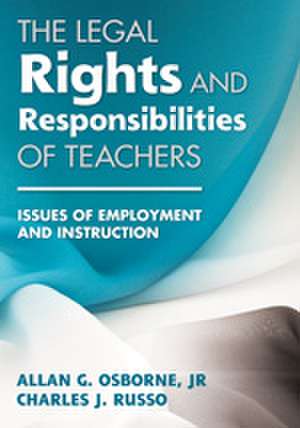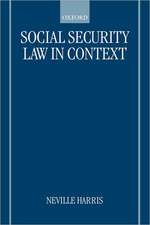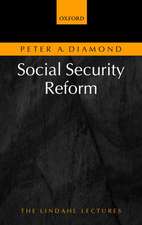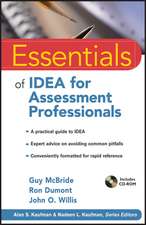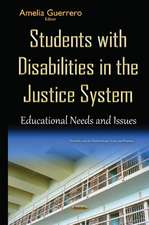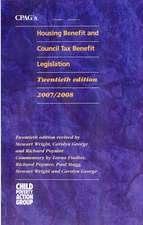The Legal Rights and Responsibilities of Teachers: Issues of Employment and Instruction
Autor Allan G. Osborne, Charles Russoen Limba Engleză Paperback – 18 mai 2011
In the instructional domain the book is designed to explore the rights and responsibilities teachers have in the instructional process. This will include topics such as what can and cannot be taught, academic freedom, methodology, grading policies, student records, and copyright law. Information will be provided about tort liability and the teacher's responsibilities regarding the safety and well-being of his or her students as well as his or her own protections from defamation and rights of self-defense.
Preț: 380.28 lei
Nou
72.77€ • 76.17$ • 60.56£
Carte tipărită la comandă
Livrare economică 31 martie-14 aprilie
Specificații
ISBN-10: 1412975468
Pagini: 352
Dimensiuni: 178 x 254 x 21 mm
Greutate: 0.71 kg
Ediția:1
Editura: SAGE Publications
Colecția Corwin
Locul publicării:Thousand Oaks, United States
Recenzii
"A clear understanding of rights and obligations allows teachers to approach their jobs with confidence, and will allay any fears based on rumor or misconceptions of the law."
"Reading this book is the next best thing to taking a class on educational law. It could well serve as the resource for such a class!"
"Uses real-world applications and issues to apply legal concepts and tested decisions to the entire educator environment. Chapters are packed with legal references and anotations for further research and clarifications."
Cuprins
Acknowledgments
About the Authors
1. Introduction: The Historical and Legal Foundations of Public Education
Introduction
A Brief History of Public Education in America
Legal Fundamentals of Education
Summary and Recommendations
Frequently Asked Questions
What's Next
Endnotes
2. School Governance and the Teacher
Introduction
The Role of the Federal Government
State Education Agencies
Local School Boards
School Finance and Use of Property
Summary and Recommendations
Frequently Asked Questions
What's Next
Endnotes
3. Basic Constitutional Rights and Freedoms
Introduction
First Amendment Rights
Privacy
Due Process
Summary and Recommendations
Frequently Asked Questions
What's Next
Endnotes
4. Employment Terms and Conditions
Introduction
Teacher Certification or Licensure
Privacy Rights of Teachers
Salaries and Terms of Employment
Leaves of Absence
Teacher Evaluations
Resignations
Summary and Recommendations
Frequently Asked Questions
What's Next
Endnotes
5. Collective Bargaining
Introduction
Historical Background
Bargaining Units and Their Composition
Union Rights
Dispute Resolution
Summary and Recommendations
Frequently Asked Questions
What's Next
Endnotes
6. Prohibitions Against Employment Discrimination
Introduction
Race, Color, Ethnicity, or National Origin
Gender
Religion
Disability
Age
Genetic Information
Retaliation
Affirmative Action
Summary and Recommendations
Frequently Asked Questions
What's Next
Endnotes
7. Teacher Discipline, Dismissal, and Due Process
Introduction
Tenure Rights
Progressive Discipline and Dismissal of Teachers
Reduction in Force
Summary and Recommendations
Frequently Asked Questions
What's Next
Endnotes
8. Curricular and Instructional Issues
Introduction
Control of the Curriculum and Academic Freedom
Student Records
Copyright Law
Using Technology in the Classroom
Special Education and Programs for English Language Learners
Summary and Recommendations
Frequently Asked Questions
What's Next
Endnotes
9. Tort Liability
Introduction
Definitions and Types of Torts
Educational Malpractice
Civil Rights Violations
Summary and Recommendations
Frequently Asked Questions
Endnotes
Resource A: Court Systems and the Authority of Courts
Functions and Duties of the Courts
Organization of the Federal Court System
State Courts
Court Jurisdictions
Resource B: Legal Resources and References
Laws and Regulations
Court Decisions
Understanding Legal Citations
Resource C: Basic Legal Research: Maintaining Currency in an Evolving Legal Environment
Keeping Abreast of Legal Developments
Useful Education Law Websites
Glossary of Terms, Acronyms, and Abbreviations
Index
Notă biografică
Allan G. Osborne, Jr. is the retired principal of the Snug Harbor Community School in Quincy, Massachusetts, a nationally recognized Blue Ribbon School of Excellence. During his 34 years in public education, he served as a special education teacher, a director of special education, an assistant principal, and a principal. He has also served as an adjunct professor of special education and education law at several colleges, including Bridgewater State University and American International University.
Osborne earned an EdD in educational leadership from Boston College and an MEd in special education from Fitchburg State College (now Fitchburg State University) in Massachusetts. He received a BA in psychology from the University of Massachusetts.
Osborne has authored or coauthored numerous peer-reviewed journal articles, book chapters, monographs, and textbooks on legal issues in education, along with textbooks on other aspects of education. Although he writes and presents in several areas of educational law, he specializes in legal and policy issues in special education. He is the coauthor, with Charles J. Russo, of five texts published by Corwin, a SAGE company.
A past president of the Education Law Association (ELA), Osborne has been an attendee and presenter at most ELA conferences since 1991. He has also written a chapter now titled "Students With Disabilities" for the Yearbook of Education Law, published by ELA, since 1990. He is on the editorial advisory committee of West¿s Education Law Reporter and is coeditor of the "Education Law Into Practice" section of that journal, which is sponsored by ELA. He is also on the editorial boards of several other education journals.
In recognition of his contributions to the field of education law, Osborne was presented with the McGhehey Award by ELA in 2008, the highest award given by the organization. He is also the recipient of the City of Quincy Human Rights Award, the Financial Executives Institute of Massachusetts Principals Award, the Junior Achievement of Massachusetts Principals Award, and several community service awards.
Descriere
Do you know what you can and can’t say and do in your school? Most teacher education programs offer little, if any, instruction on education law. When teachers need advice regarding employment or instructional issues, they may find the search frustrating, time-consuming, or costly. Teachers will find the answers to their most frequently asked legal questions in this easy-to-read book. Key topics include:
- Certification, tenure, evaluation, and dismissal
- Collective bargaining and teacher contracts
- Constitutional rights of teachers
- Discrimination and harassment
- Teachers’ responsibility regarding student bullying
- Academic freedom
- Copyright law
- Safety
